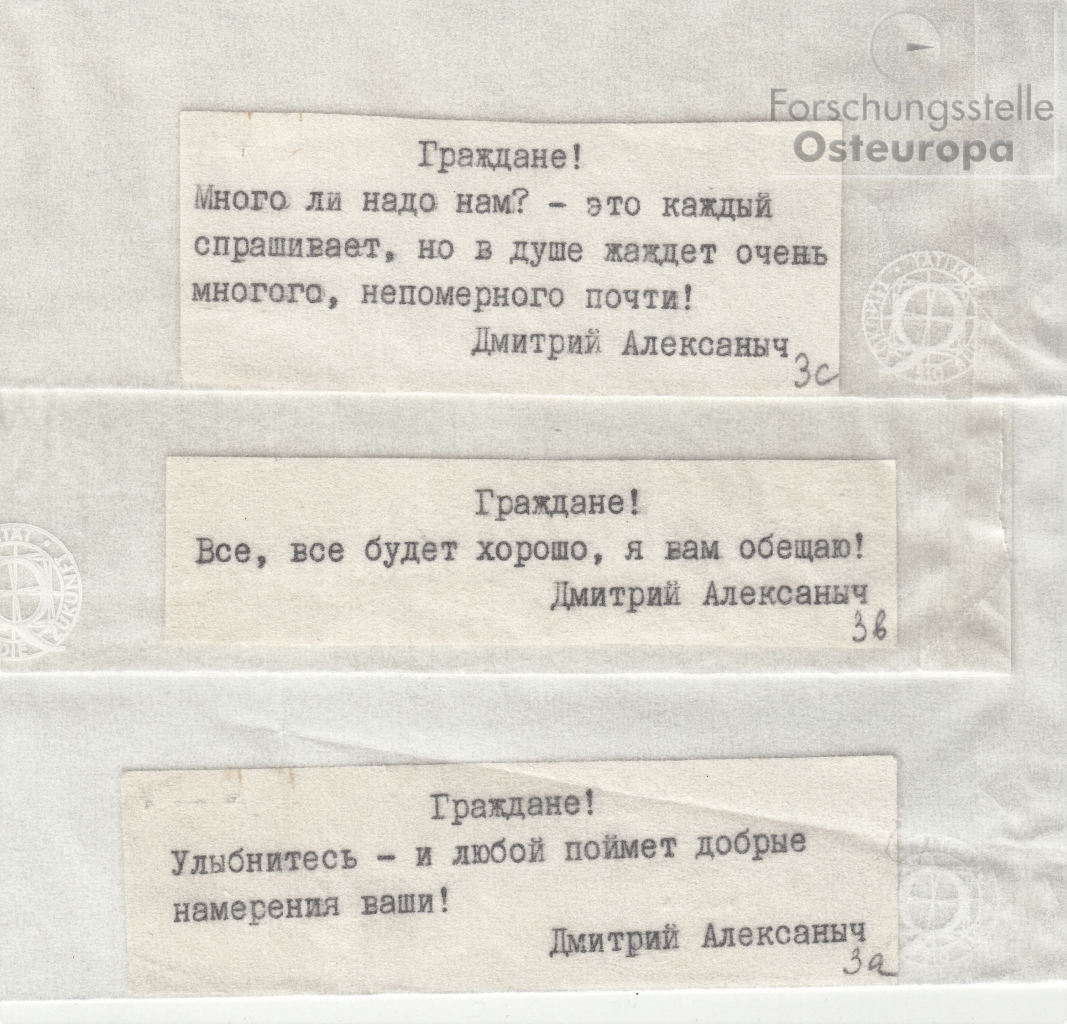Odesa-Tage 2025
Kolloquiumsvortrag
18:15 Uhr, / Zoom
Eka Tchkoidze (Halle) | Medieval History in Georgian Literature and Film (19 th -20th ct.). Some Aspects of Shaping Georgian National Identity
Discussion, 02.12.2025, 18:00, EuropaPunkt
"Occupation, torture, and violations of nuclear safety", with Rebecca Harms (former MEP), Roman Koval (Truth Hounds) and Yana Lysenko (FSO Bremen). Moderated by Eduard Klein (FSO Bremen).
Wissenswertes
Last Stop: Dnipro
Dmitrii Prigov’s literary appeals had been sent back to Bremen just before the Russian invasion of Ukraine started

Prigov’s appeals. See below for a translation into English. Archive of the Research Centre for East European Studies, photo: Maria Klassen.
„Citizens!
Do we need much? – that is what everyone asks, but secretly everybody wants a lot, almost immeasurably much!
Citizens!
Everything, everything will be alright, I promise!
Citizens!
Smile – and everyone will understand you good intentions!
Dmitrii Aleksanych“
The last article about this “Document of the Month” was written by our archivist Maria Klassen describing Dmitrii Prigov’s work and its journey from Bremen to various cities in Eastern Europe. Its last stop was Dnipro. Now Maria Yarchuk, co-curator and member of „Kultura Medialna”, recalls the events surrounding the exhibition.
“From the end of autumn 2021, we started receiving more and more disturbing news about the Russian troops gathering along our border, about meetings of different military committees and European analytics predicting the war. Until the very beginning of the invasion, however, we did not believe in these predictions, simply because we did not want to.
In hindsight, we could have known that it would happen. In the middle of February, the tension reached its peak.
The last day of the exhibition was the 12th of February. The insurance for the exhibits lasted until the end of the month, which meant that we had only 2 days to pack all the artwork and send it back. I remember that day very well: I was alone in the cultural center wrapping up each piece until 2 am. It probably seems weird, I was extremely tired but happy that this activity kept me from reading the news and being scared all the time.
On the next morning we loaded the car and started moving towards the border. The destination was Prague, where all the furniture, the sound and video equipment, and some copies were sent. Everything was delivered on the 23rd of February. On this day we were working in the office and we even had a zoom call scheduled to plan further events, where we were nervously joking that we should consider online formats again – just in case.
That night I was unable to sleep, watching the urgent meeting of the United Nations Security Council instead, where they were talking about diplomacy and the importance of negotiations. Right during this meeting, it was around 5 in the morning, I heard the first explosions. I remember that I hesitated calling my parents who live outside the city, because I didn’t want to wake them up. I finally called anyway and said: ‘it has begun'.”
Maria Yarchuk
Länder-Analysen
» Länder-Analysen
» Eastern Europe - Analytical Digests
Discuss Data
Archiving, sharing and discussing research data on Eastern Europe, South Caucasus and Central AsiaOnline-Dossiers zu
» Erdgashandel
» Hier spricht das Archiv
» Russian street art against war
» Dissens in der UdSSR
» Duma-Debatten
» 20 Jahre Putin
» Protest in Russland
» Annexion der Krim
» sowjetischem Truppenabzug aus der DDR
» Mauerfall 1989

